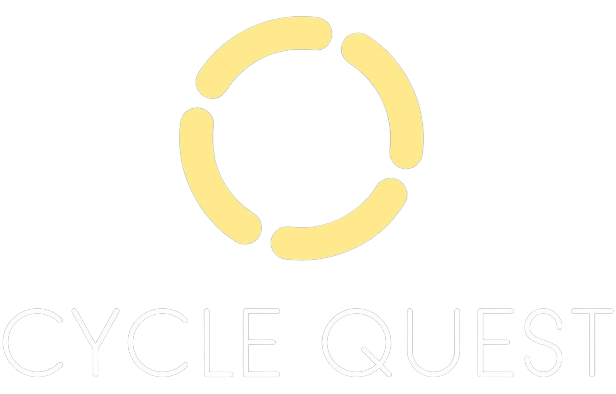This article ventures into the compelling integration of cyclical analysis and Google Trends data. Concentrating on two distinctly different datasets – “ebook” and “holidays in Europe” search inquiries from the United States, we aim to penetrate the inherent rhythms and patterns of these search behaviors.
Our objective is to ascertain whether these unearthed patterns possess the capability of predicting future frequencies of such search queries. By leveraging the potency of cyclical analysis, we have the potential to revolutionize our comprehension of online search patterns, unveiling new pathways for predictive analytics and strategic planning.
By combining cyclical analysis and Google Trends, we can anticipate the evolution of search query frequencies.
Our research reveals that Cycle Quest is able to accurately predict highs and lows in search queries.
Leverage the power of predictive analytics offered by Cycle Quest to gain a competitive advantage and make informed decisions. Contact us today to learn more.
Table of Contents
Google Trends Data: Predicting Search Query Frequency Evolution
Google Trends, an invaluable tool, showcases the popularity of search queries over time. Google Trends providesinsights into web search and youtube search patterns, enabling users to analyze seasonal trends and track the popularity of search queries within a specific time range.
Its ability to track search trends and search results lends a unique insight into the ever-evolving interests of internet users, making it an integral part of market research, keyword optimization, and consumer behavior analysis. Understanding how Google Trends works can enhance strategies for predicting future search behaviors and trends.
Now, imagine stepping into a world where it’s not only possible to ascertain current search trends but also predict their future evolution thanks to algorithms based on what Google Trends provides.
This is no longer mere speculation but an achievable reality with the integration of Google Trends and cyclical analysis. By harnessing the power of Cycle Quest’s predictive analytics, we can anticipate the rise and fall of search query frequencies, thereby empowering businesses to make strategic decisions based on future projections.
This pioneering approach, as our research shows, accurately predicts the highs and lows in search queries, paving the way for a new era of predictive analytics in the digital landscape.
Our findings emphasize the enormous potential in leveraging the robust predictive capabilities of Cycle Quest, thereby offering a competitive edge to businesses willing to navigate the unpredictable terrains of online search patterns with confidence and foresight.
The Power of Anticipating Google Query Evolution to Find the Next Big Keyword
The potential benefits of accurately predicting the evolution of Google search queries are expansive and rewarding. First and foremost, this predictive capability allows businesses to remain ahead of the curve in their respective industries. Based on Google Trends, businesses can tailor their google ads campaign and google shopping ads to align with real-time search trends.
Data can reveal high search interest in particular topics, providing invaluable insights for google trends for keyword research. Another useful feature of Google Trends is its ability to predict increased search volume and useful feature of Google Trends is its historical data analysis. Google Trends can give businesses the competitive edge they need.
By anticipating trends, they can optimize their marketing efforts, refine their product offerings, and cater to the evolving interests of their target audience with precision. This kind of strategic planning could potentially lead to increased market share and improved customer satisfaction.
Furthermore, this foresight is invaluable for researchers. It enables them to identify and study emerging trends, contributing to a deeper understanding of consumer behavior and societal shifts. By leveraging these insights, researchers can contribute valuable data to their fields and guide future studies in insightful directions.
For individuals, particularly those involved in digital marketing, content creation, or keyword optimization, predicting search query evolution can guide them in creating targeted, timely, and engaging content that resonates with their audience. By leveraging Google Trends to analyze search trends, users can search the term and explore related search terms to help you identify opportunities.
In essence, the ability to anticipate the rise and fall of Google search queries is a powerful tool that can propel businesses, individuals, and researchers into a future of informed decision-making, strategic advantages, and innovative exploration.
The Evidence of Cyclical Behavior in Google Trends Search Data
In the following section, we will probe deeper into the power of cyclical analysis as a predictive tool. Through a meticulous examination of various charts, we will unearth the remarkable accuracy of Cycle Quest’s predictions for distinctly different queries: “ebook” and “holidays in Europe.”
Each chart serves as a testimony to the efficacy of this innovative approach, highlighting the relevance of predictive analytics in understanding and leveraging Google search trends. Let’s dive in and unravel the patterns that dictate the rhythm of these search queries.
Identifying Clear Cyclical Behavior within Google Search Insight
Upon examining Chart 1 and Chart 2, the cyclical behaviors of the “ebook” and “holidays in Europe” search queries become evident. Interestingly, both these distinct datasets exhibit a certain rhythmic pattern that can be predicted with a high degree of accuracy.
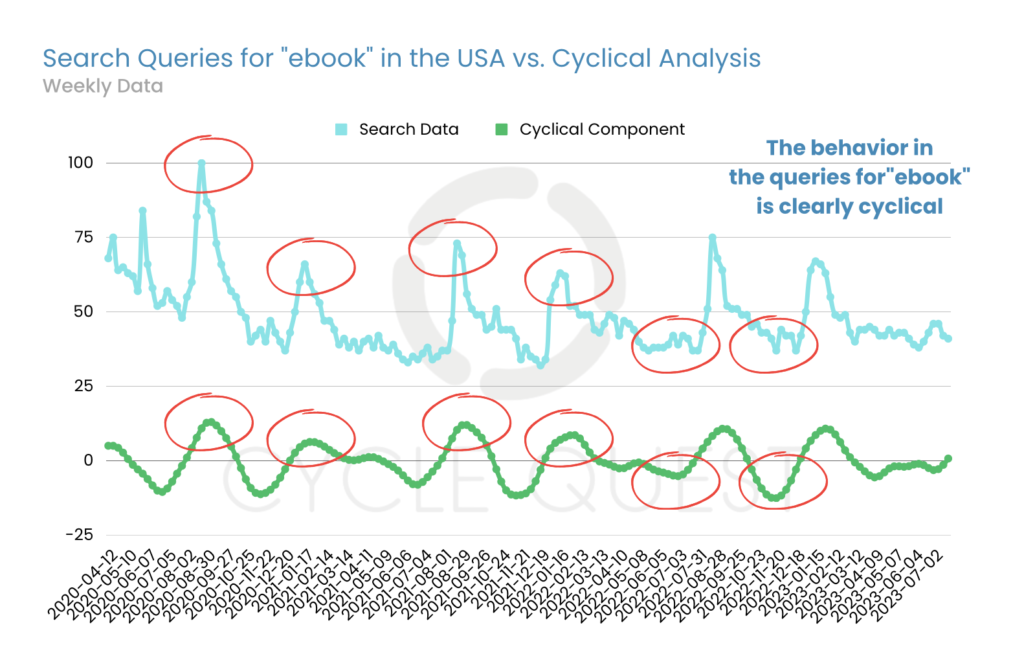
Source for Query Search: Google Trends
The “ebook” search query, as depicted in Chart 1, shows a typical cyclical behavior with apparent peaks and troughs. The Cycle Quest predictions accurately align with these highs and lows, demonstrating its power as a predictive tool.
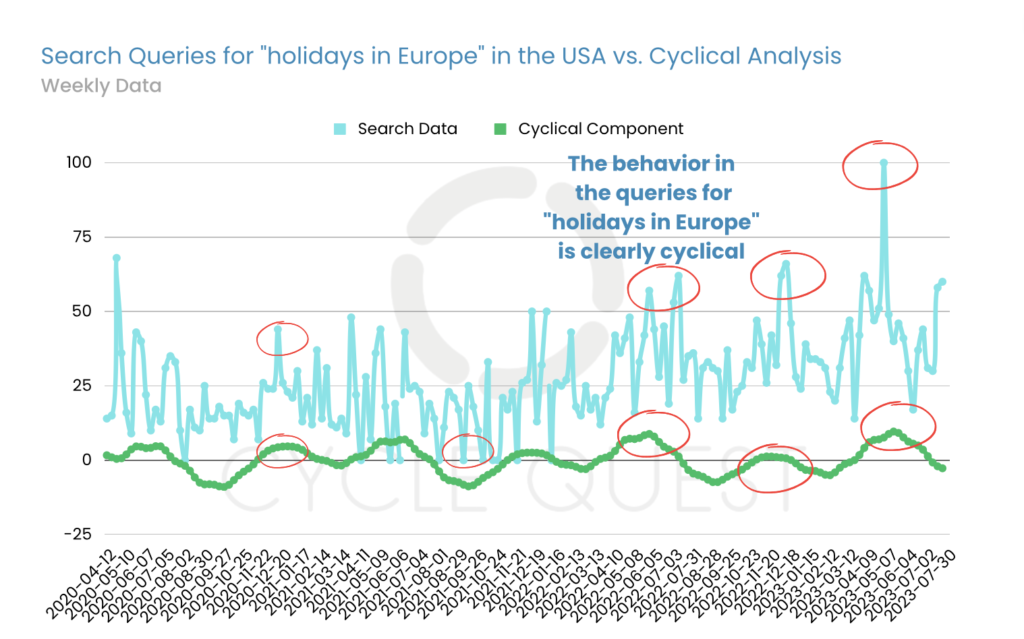
Source for Query Search: Google Trends
Similarly, the “holidays in Europe” search query shown in Chart 2 also presents a clear cyclical pattern. The peaks during summer and troughs in winter align masterfully with the Cycle Quest predictions, further strengthening the claim of its predictive capability.
These analyses provide compelling evidence of the efficacy of Cycle Quest’s predictive analytics. By employing cyclical analysis, businesses, researchers, and individuals can anticipate the ebb and flow of Google search queries, helping them stay ahead in their respective fields by making informed, strategic decisions.
Proving the Efficacy of Cyclical Analysis for Keyword Research
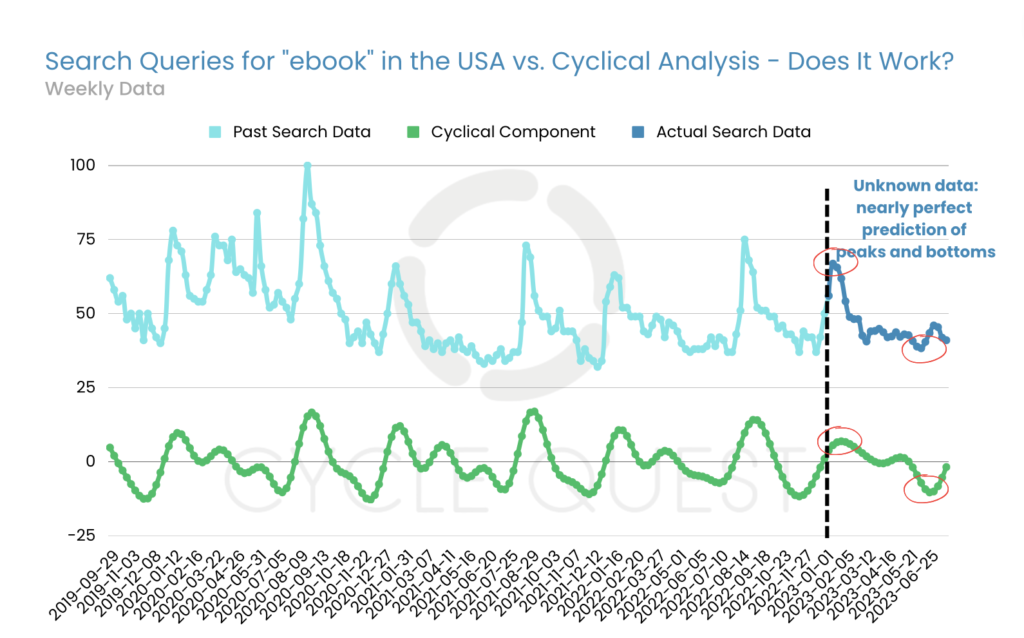
Source for Query Search: Google Trends
Chart 3 presents an in-depth examination of the “ebook” search query. As the chart illustrates, Cycle Quest’s predictive analytics were able to accurately anticipate significant turns in the query’s frequency. By examining historical searchdata, the tool identified a clear example of this precision: the peak in late January 2023. Similarly, Cycle Quest was successful in forecasting the approaching trough in June 2023, demonstrating its efficacy in anticipating cyclical turns. This analysis can be particularly beneficial for youtube channels and other platforms looking to capitalize on high search volume periods, optimizing their marketing strategies accordingly.
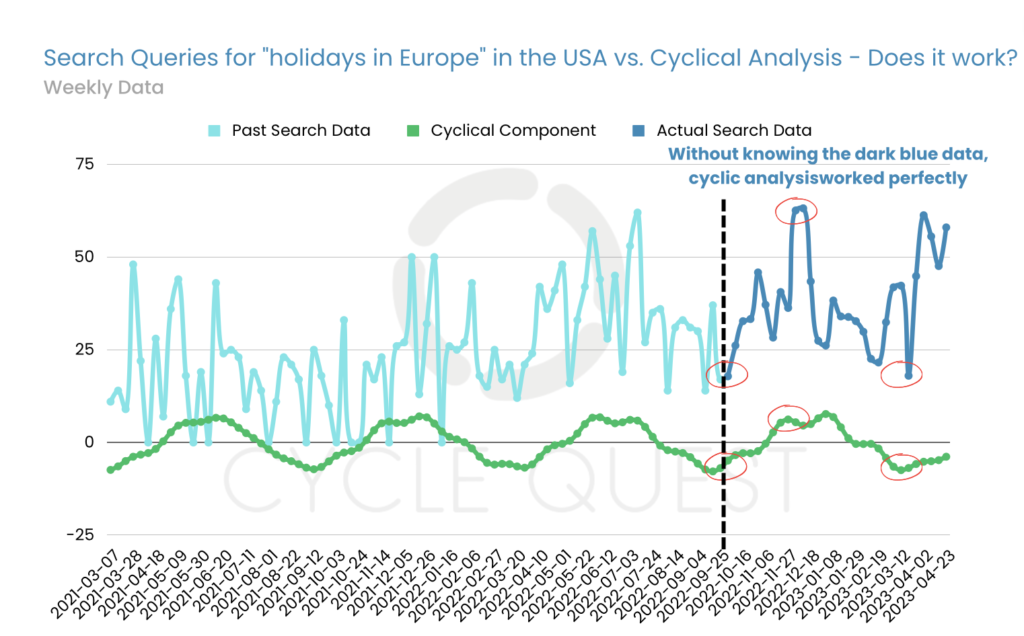
Source for Query Search: Google Trends
In Chart 4, the focus shifts to the predictions for the “holidays in Europe” search query. The accuracy of Cycle Quest’s predictions is once again evident. The model accurately foresaw the bottom of the cycle in September 2022 and the subsequent peak in November 2022. Furthermore, the predictions extended to the upcoming low in March 2023, further solidifying the reliability of Cycle Quest’s cyclical analysis.
These findings underscore the indisputable value Cycle Quest’s predictive analytics offer in decoding the intricacies of Google search trends, empowering businesses, researchers, and individuals to navigate online interests with confidence, foresight, and strategic acumen.
Use Google Trends and Cycle Quest to Predict the Future of the “Ebook” Query Popularity
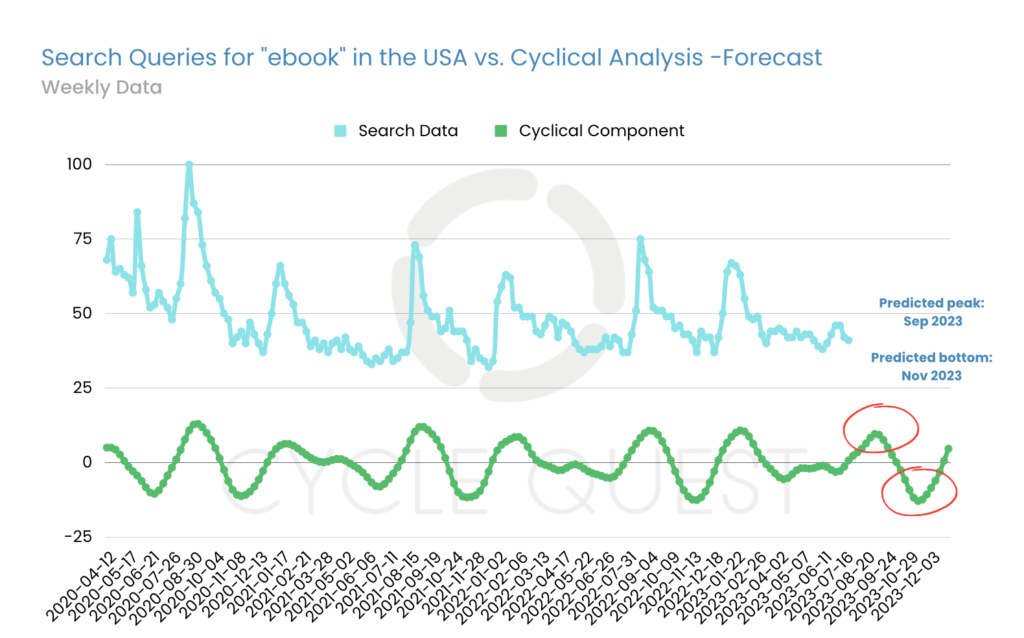
Source for Query Search: Google Trends
Would you expect to find seasonal trends in the ebook market? Well, consider this: Chart 5 offers a forward-looking prediction for the “ebook” search query in the United States. The graph indicates a likely peak in September 2023, followed by an expected bottom around November 2023.
This future prediction holds significant implications for various sectors. For the publishing industry, this data can guide strategic planning around book launches and marketing campaigns. For educational institutions, the predicted peak in ebook queries could signal an ideal time to roll out digital learning resources.
Furthermore, digital marketers, SEO specialists, and content creators can leverage this predictive insight to strategically time their campaigns and content releases, maximizing reach and engagement.
Furthermore, imagine what other keywords may follow the “ebook” search query cycle. A business such as a bank, for instance, may anticipate the rise in queries for “personal finance” or “home loans”—two topics that may gain relevance as people begin researching more about ebooks.
Another example of leveraging Cycle Quest’s predictive analytics would be to identify the optimal time to advertise related products or services. A business may anticipate a peak in ebook queries and use that insight to push relevant offers, such as promotional discounts on computers or tablets.
In essence, this predictive capability offers a powerful tool for informed decision-making, helping stakeholders across industries to anticipate market trends and align their strategies accordingly. It’s a testament to Cycle Quest’s potential to transform the business landscape by offering a competitive edge through strategic foresight.
Cycle Quest – Your Partner in Cyclical Analysis for SEO Help
Now here’s the thing: Google Trends doesn’t provide you with cyclical tools, but we do. Cycle Quest provides bespoke cyclical analysis solutions designed to meet the unique requirements of businesses, investors, and inquisitive individuals. Their team is composed of advisors with deep industry-specific knowledge, guaranteeing insightful sourcing and analysis of optimal datasets.
Here’s a three-step process to get started with Cycle Quest:

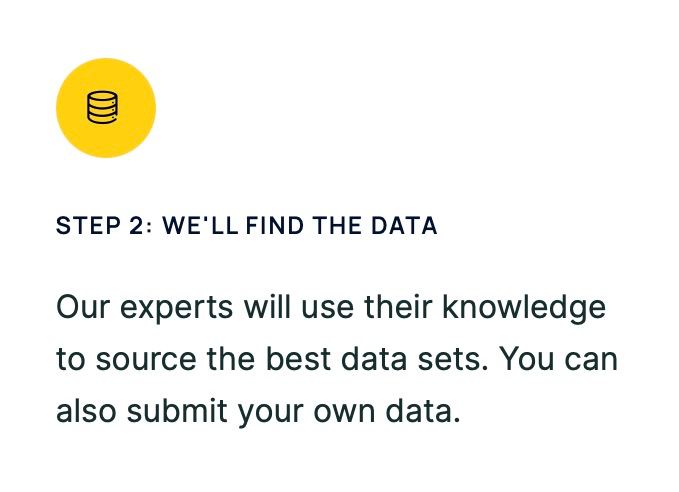
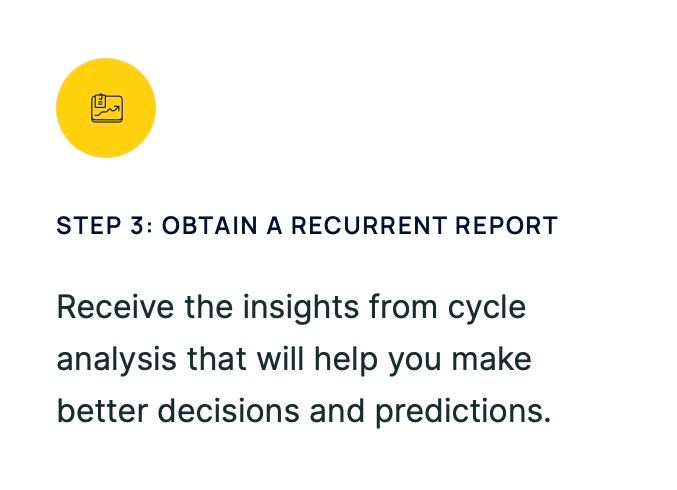
Reach out to us to discover how cyclical analysis has been successfully applied in various fields such as business, investments, sports, and science. Let Cycle Quest help you uncover the concealed cyclical trends within your data, empowering you to outpace competitors and fine-tune your strategies.
Frequently Asked Questions About Predicting Google Search Trends
What is Google Trends and how does it work?
Google Trends is a free tool provided by Google that shows how often a particular search term is entered relative to the total search-volume across various regions of the world. It works by analyzing a portion of Google searches to compute how many searches have been done for the terms entered, relative to the total number of searches done on Google over the same time.
How can I use Google Trends for my SEO strategy?
You can use Google Trends for SEO by analyzing search volume trends, finding related queries and trending topics, comparing search terms, leveraging real-time data, and identifying seasonal or long-term trends to optimize your content for search engines.
What are some ways to use Google Trends for market research?
You can use Google Trends to identify shopping trends, understand consumer behavior, analyze search interests, track changes in search terms over time, and gather insights for your market research to make informed business decisions.
Can Google Trends help in keyword research for SEO?
Yes, Google Trends can be a valuable tool for keyword research as it provides data on search volume trends, related queries, and popular topics, helping you identify relevant keywords to target in your SEO strategy.
How does Google Trends differ from Google News?
Google Trends focuses on analyzing search interest and trends for specific search terms, while Google News provides news articles and headlines from various online sources. Both tools offer valuable insights but serve different purposes.
Is Google Trends a free tool to use?
Yes, Google Trends is a free tool provided by Google that anyone can access to track search trends, analyze search interests, and gather data on popular topics and keywords.
How can I utilize Google Trends data for my SEO strategy?
You can leverage Google Trends data to optimize your content for search engines by identifying popular search terms, monitoring real-time trends, and tailoring your content to match the search interests of your target audience. Combine it with Cycle Quest’s cycle analysis to predict what users will search for in the future.
